if引导的虚拟语气
虚拟语气句型
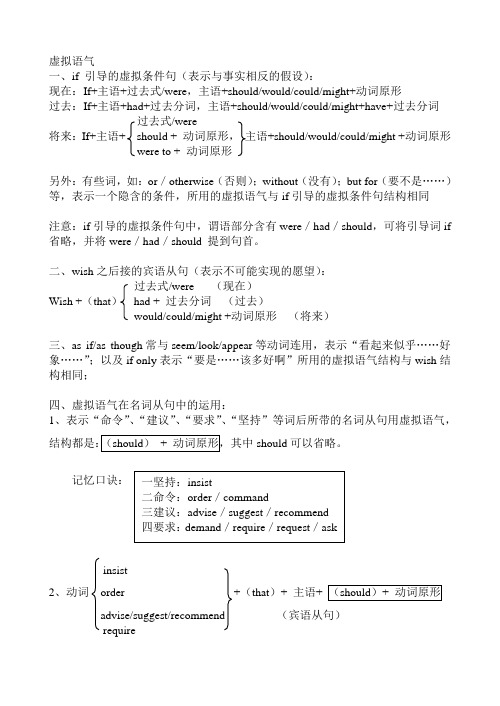
虚拟语气一、if 引导的虚拟条件句(表示与事实相反的假设):现在:If+主语+过去式/were ,主语+should/would/could/might+动词原形过去:If+主语+had+过去分词,主语+should/would/could/might+have+过去分词过去式/were将来:If+主语+ should + 动词原形, 主语+should/would/could/might +动词原形were to + 动词原形另外:有些词,如:or /otherwise (否则);without (没有);but for (要不是……)等,表示一个隐含的条件,所用的虚拟语气与if 引导的虚拟条件句结构相同注意:if 引导的虚拟条件句中,谓语部分含有were /had /should ,可将引导词if 省略,并将were /had /should 提到句首。
二、wish 之后接的宾语从句(表示不可能实现的愿望):过去式/were (现在)Wish +(that ) had + 过去分词 (过去)would/could/might +动词原形 (将来)三、as if/as though 常与seem/look/appear 等动词连用,表示“看起来似乎……好象……”;以及if only 表示“要是……该多好啊”所用的虚拟语气结构与wish 结构相同;四、虚拟语气在名词从句中的运用:1、表示“命令”、“建议”、“要求”、“坚持”等词后所带的名词从句用虚拟语气,结构都是:(should ) + 动词原形,其中should 可以省略。
记忆口诀:insist2、动词 order +(that )+ 主语+ (should )+ 动词原形advise/suggest/recommend (宾语从句)require一坚持:insist 二命令:order /command 三建议:advise /suggest /recommend 四要求:demand /require /request /ask3、名词:advice/suggestion/order /request之后接表语从句或同位语从句,谓语部分也是用(should)+ 动词原形;4、在主语从句中:It is suggested/required/ordered/…that + 主语+ (should)+ 动词原形;It is important/strange/necessary/…that + 主语+ (should)+ 动词原形;过去式(现在/将来)五、would rather + sb. +had + 过去分词(过去)六、It is (high) time that + 主语+ 过去式鱼儿,在水中串上串下,吐着顽皮的泡泡;鸟儿从荷叶上空飞过,想亲吻荷花姑娘的芳泽。
虚拟语气

If it snowed/were to snow/should snow tomorrow,we could change our plan.
如果明天下雪,我们会改变计划。
将来
二、虚拟语气的倒装形式
1)If it had not been for your help,we would never have been able to get out of trouble. → Had it not been for your help,we would never have been able to get out of trouble. 2)If it should snow tomorrow,we would put off our trip. → Should it snow tomorrow,we would put off our trip. 3)If I were you,I would buy that car. → Were I you,I would buy that car.
他立刻去老师的办公室很有必要。
增:
现在的事实 If it were not for the fact that you are ill,I would ask you to do this right now.
如果不是你病了,我会让你立刻做这件事。
If he had followed my advice,he wouldn’t 过去 have lost his job.
如果他听了我建议,他不会失去他的 工作。
情况3:与将来事实相反
If sb. did/were to do/should do …,sb. would/could/might do.
if引导的条件句中的虚拟语气
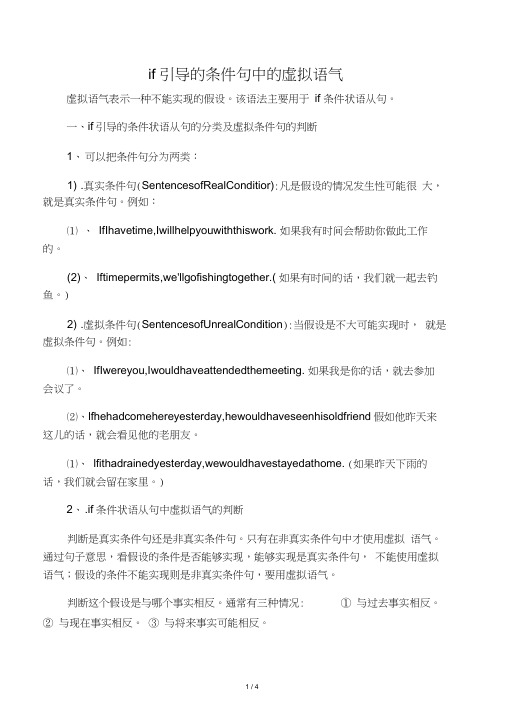
if 引导的条件句中的虚拟语气虚拟语气表示一种不能实现的假设。
该语法主要用于if 条件状语从句。
一、if引导的条件状语从句的分类及虚拟条件句的判断1、可以把条件句分为两类:1) .真实条件句(SentencesofRealConditior):凡是假设的情况发生性可能很大,就是真实条件句。
例如:⑴ 、IfIhavetime,Iwillhelpyouwiththiswork. 如果我有时间会帮助你做此工作的。
(2)、Iftimepermits,we'llgofishingtogether.( 如果有时间的话,我们就一起去钓鱼。
)2) .虚拟条件句(SentencesofUnrealCondition):当假设是不大可能实现时,就是虚拟条件句。
例如:⑴、IfIwereyou,Iwouldhaveattendedthemeeting. 如果我是你的话,就去参加会议了。
⑵、lfhehadcomehereyesterday,hewouldhaveseenhisoldfriend假如他昨天来这儿的话,就会看见他的老朋友。
⑴、lfithadrainedyesterday,wewouldhavestayedathome. (如果昨天下雨的话,我们就会留在家里。
)2、.if条件状语从句中虚拟语气的判断判断是真实条件句还是非真实条件句。
只有在非真实条件句中才使用虚拟语气。
通过句子意思,看假设的条件是否能够实现,能够实现是真实条件句,不能使用虚拟语气;假设的条件不能实现则是非真实条件句,要用虚拟语气。
判断这个假设是与哪个事实相反。
通常有三种情况: ① 与过去事实相反。
② 与现在事实相反。
③ 与将来事实可能相反。
3、“后退一步法后退一步法是指在准确地判断了该句与哪一事实相反后,按虚拟语气的后退一步法处理从句谓语动词的时态。
即:在非真实条件状语从句中,谓语动词按正常情况“后退一步”。
也就是:① 与过去事实相反,在从句中用过去完成时形式表示。
if引导的条件句中的虚拟语气

if 【2 】引诱的前提句中的虚拟语气虚拟语气表示一种不能实现的假设.该语法重要用于if前提状语从句.一.if引诱的前提状语从句的分类及虚拟前提句的断定1.可以把前提句分为两类:1).真实前提句(Sentences of Real Condition):凡是假设的情形产素性可能很大,就是真实前提句.例如:⑴.If I have time , I will help you with thiswork.假如我有时光会关心你做此工作的.(2).If time permits, we'll go fishingtogether.(假若有时光的话,我们就一路去垂纶.)2).虚拟前提句(Sentences of UnrealCondition):当假设是不大可能实现时,就是虚拟前提句.例如:⑴.If I were you , I would have attended the meeting.假如我是你的话,就去参加会议了.⑵.If he had come here yesterday, he would have seen his oldfriend.假如他昨天来这儿的话,就会看见他的老同伙.⑴.If it had rained yesterday, we would have stayed athome.(假如昨世界雨的话,我们就会留在家里.)2..if前提状语从句中虚拟语气的断定断定是真实前提句照样非真实前提句.只有在非真实前提句中才应用虚拟语气.经由过程句子意思,看假设的前提是否可以或许实现,可以或许实现是真实前提句,不能应用虚拟语气;假设的前提不能实现则长短真实前提句,要用虚拟语气.断定这个假设是与哪个事实相反.平日有三种情形:①与曩昔事实相反.②与如今事实相反.③与未来事实可能相反.3.“撤退退却一步法”撤退退却一步法是指在精确地断定了该句与哪一事实相反后,按虚拟语气的撤退退却一步法处理从句谓语动词的时态.即:在非真实前提状语从句中,谓语动词按正常情形“撤退退却一步”.也就是:①与曩昔事实相反,在从句顶用曩昔完成时情势表示.②与如今事实相反,在从句顶用曩昔一般时情势表示.③与未来事实可能相反,在从句顶用曩昔未来时情势表示.主句中则用情态动词would, should, could等加一个与从句一致的动词情势.例:⑴.If I had come her yesterday, I would have seen him.⑵.If I were a teacher, I would be strict with my students.⑶.If it should snow tomorrow, they couldn't go out.4.留意事项①if前提句中若有were, should,had,可以省去if,并应用倒装语序.②在现代英语中if前提状与从句中的谓语动词假如是be其曩昔情势一般用were.二.虚拟语气在if 引诱的前提句中的用法:(一).表示与如今事实相反的情形.其句子构造为:从句:if + 主语+动词的曩昔式(be 用were) + ……主句:主语+ would (should, could , might) + 动词本相+ ……例:1.If I were you, I would go with him.2.If the weather were fine, I would gothere.假如气象好,我去那儿.(事实气象不好)3.If I were you, I would read itagain.假如我是你的话,我再读一遍.(事实上我不是你)4.If time permitted, I would write itagain.假如时光许可的话,我再写一遍.(事实上时光不许可)5.If it weren’t snowing, we wouldn’t stay in thehouse.如果如今不下雪的话,我们就不会待在屋里.(事实上如今下雪)6.What would I do if I were in yourplace?如果我处于你地位我会怎么办?(事实上我不在你的地位上)7.If he hurried, he could catch the firstbus.他如果快点可以或许赶上头班公共汽车.(可是他不焦急)8. If it weren’t for your help, we would get intotrouble.假如没有你们的关心,我们就会陷入困境.(而事实上得到了你们的关心)9.If we had the manpower, we could open up even more land.假若有人力,我们还能开更多的荒地.10. If I were you, I would go with him.(从句If I were you, 主句I would go with him.)11. If I were you, I should buyit.(从句用曩昔式动词were,主句用动词本相buy)12. If I had time, I would studyFrench.(假若有时光,我会进修法文.)(从句用曩昔式动词had,主句用动词本相study)13. If she knew English, she would not ask me forhelp.(假如她懂英文,她就不必要我帮了.)(从句用曩昔式动词knew, 主句用动词本相ask)留意:假如动作在进行中,主句要用:"主语+ would be + 进行式动词+ ……"14. If they were here, he would be speaking to them now.(从句用曩昔式动词were, 主句用would be speaking)。
if和will的用法虚拟语气

if和will的用法虚拟语气一、if和will的用法概述if和will都是英语中常用的虚拟语气形式,用来表示与实际情况相反或假设的情况。
它们有着各自独特的用法和含义,在句子中起到不同的作用。
二、if引导条件句时的用法1. 表示可能性如果真实情况下可能发生某事,可以使用if引导条件从句。
例如:If it rains tomorrow, we will stay at home.(如果明天下雨,我们就会呆在家里。
)这个句子表示,如果明天下雨这种可能性存在,那么我们将选择待在家里。
2. 表示假设当前提是无法满足或纯粹是个假设时,可以使用if引导条件从句。
例如:If I were you, I would study harder.(如果我是你,我会更加努力学习。
)在这个例子中,“我是你”这个前提显然是不可能实现的,所以我们使用了“were”而不是“was”。
3. 表示建议通过一个假设来为对方提出建议或提供帮助时,可以使用if引导条件从句。
例如:If you need any assistance, feel free to ask me for help.(如果你需要任何帮助,请随时向我寻求。
)在这个句子里,“如果你需要任何帮助”是一个假设条件,用来表示作者愿意提供帮助。
三、will引导虚拟条件句时的用法1. 表示说话人的意愿或意图当说话人通过虚拟语气表达自己对某事的意愿或意图时,可以使用will引导后面的从句。
例如:She asked me if I would help her with the project.(她问我是否愿意帮她完成这个项目。
)在这个例子中,“我愿意帮忙”正好符合了will的用法,表达出了说话人对于帮助的意愿。
2. 表示猜测或推测在一些情况下,使用will来表示根据某种迹象或判断得出某种猜测或推测。
例如:If he doesn't hurry up, he will miss the train.(如果他不赶紧,他会错过火车。
if对将来的虚拟语气
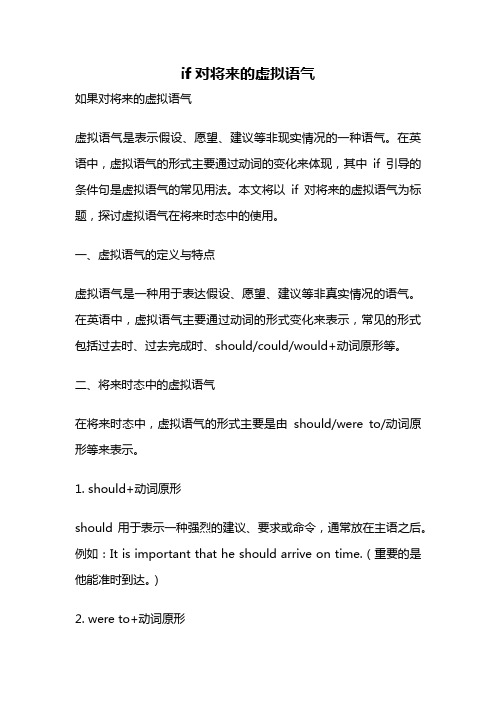
if对将来的虚拟语气如果对将来的虚拟语气虚拟语气是表示假设、愿望、建议等非现实情况的一种语气。
在英语中,虚拟语气的形式主要通过动词的变化来体现,其中if引导的条件句是虚拟语气的常见用法。
本文将以if对将来的虚拟语气为标题,探讨虚拟语气在将来时态中的使用。
一、虚拟语气的定义与特点虚拟语气是一种用于表达假设、愿望、建议等非真实情况的语气。
在英语中,虚拟语气主要通过动词的形式变化来表示,常见的形式包括过去时、过去完成时、should/could/would+动词原形等。
二、将来时态中的虚拟语气在将来时态中,虚拟语气的形式主要是由should/were to/动词原形等来表示。
1. should+动词原形should用于表示一种强烈的建议、要求或命令,通常放在主语之后。
例如:It is important that he should arrive on time.(重要的是他能准时到达。
)2. were to+动词原形were to用于表示一种假设的情况,通常用于if引导的条件句中,表示与现实相反的情况。
例如:If I were to win the lottery, I would travel around the world.(如果我中了彩票,我会环游世界。
)3. 动词原形动词原形用于表示一种愿望或假设的情况,通常用于if引导的条件句中。
例如:If it doesn't rain tomorrow, we will go hiking.(如果明天不下雨,我们将去远足。
)三、虚拟语气在将来时态中的用法1. 表示假设在将来时态中,if引导的条件句可以用虚拟语气来表示一种假设的情况。
例如:If I were rich, I would buy a big house.(如果我有钱,我会买一栋大房子。
)2. 表示愿望虚拟语气还可以用来表示一种愿望的情况。
例如:I wish I could fly.(我希望我能飞。
if引导的条件句中的虚拟语气
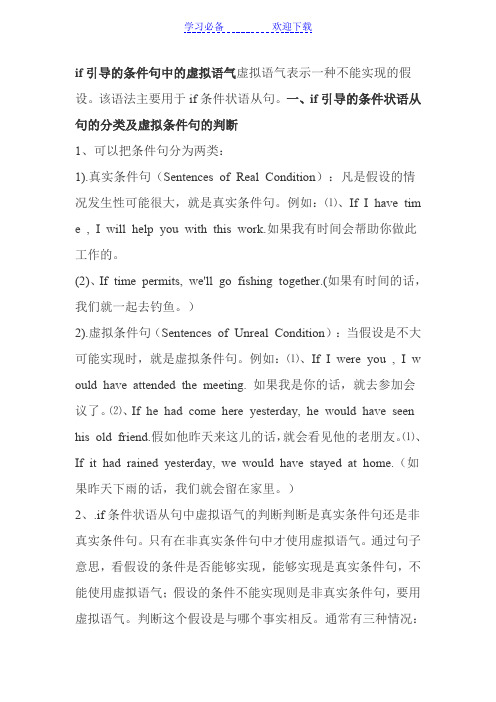
if引导的条件句中的虚拟语气虚拟语气表示一种不能实现的假设。
该语法主要用于if条件状语从句。
一、if引导的条件状语从句的分类及虚拟条件句的判断1、可以把条件句分为两类:1).真实条件句(Sentences of Real Condition):凡是假设的情况发生性可能很大,就是真实条件句。
例如:⑴、If I have tim e , I will help you with this work.如果我有时间会帮助你做此工作的。
(2)、If time permits, we'll go fishing together.(如果有时间的话,我们就一起去钓鱼。
)2).虚拟条件句(Sentences of Unreal Condition):当假设是不大可能实现时,就是虚拟条件句。
例如:⑴、If I were you , I w ould have attended the meeting. 如果我是你的话,就去参加会议了。
⑵、If he had come here yesterday, he would have seen his old friend.假如他昨天来这儿的话,就会看见他的老朋友。
⑴、If it had rained yesterday, we would have stayed at home.(如果昨天下雨的话,我们就会留在家里。
)2、.if条件状语从句中虚拟语气的判断判断是真实条件句还是非真实条件句。
只有在非真实条件句中才使用虚拟语气。
通过句子意思,看假设的条件是否能够实现,能够实现是真实条件句,不能使用虚拟语气;假设的条件不能实现则是非真实条件句,要用虚拟语气。
判断这个假设是与哪个事实相反。
通常有三种情况:①与过去事实相反。
②与现在事实相反。
③与将来事实可能相反。
3、“后退一步法”后退一步法是指在准确地判断了该句与哪一事实相反后,按虚拟语气的后退一步法处理从句谓语动词的时态。
if引导虚拟语气条件句PPT课件

06
总结与回顾
回顾if引导虚拟语气条件句的用法
虚拟语气在条件句中的用法
在条件句中,使用虚拟语气表示与实际情况相反的情况,或者表 示假设、猜测等。
虚拟语气的形式
虚拟语气有多种形式,包括与现在事实相反、与过去事实相反、与 将来事实相反等。
虚拟语气的时态
虚拟语气与时态有关,需要根据实际情况选择适当的时态。
况,主句用would+have+过 去分词的形式。
翻译题
01
02
03
中文
如果我知道这个消息,我 早就告诉你了。
英文
If I had known the news, I would have told you long ago.
解释
从句表示与过去事实相反 的情况,主句用 would+have+过去分词 的形式。
题目
If he _______ the money, he _______ able to buy a car.
had had; would be
答案
解释
从句表示与过去事实相反的情况,主句用would+______ rained last night,
the ground would be wet this morning.
表示与事实相反的情况
总结词
与事实相反的情况是指条件句中的假设与现实情况相 反,主句使用虚拟语气表示与实际情况的差异。
详细描述
在英语中,当if引导的条件句表示与事实相反的情况时, 主句通常使用虚拟语气。这种用法常用于表示某种假设 的情况并未实现,而是与现实情况相反。例如,“If I were you, I would not make that mistake again.” (如果我是你,我不会再犯那个错误了。)这句话表示 的是假设自己是对方,但实际上并不是,提醒对方不要 犯同样的错误。
英语if虚拟语气语法总结

英语if虚拟语气语法总结一、英语if虚拟语气语法总结(一)含义与概念虚拟语气是一种特殊的动词形式,用来表示说话人的主观愿望、假设、猜测、建议等非真实情况。
就像在幻想世界里搭建语言的城堡,它脱离了现实的束缚,创造出一种别样的语义空间。
在英语里,if引导的虚拟语气是其中非常重要的一部分。
(二)语法结构及解释1. 与现在事实相反- 结构:If + 主语+ 动词的一般过去式(be动词一律用were),主语+ would/should/could/might+动词原形。
- 例如:If I were you, I would study harder.(要是我是你,我就会更努力学习。
)这里的“我是你”在现实中是不可能的,所以用虚拟语气。
用were而不用was是这种虚拟语气中be动词的特殊形式,就像一种约定俗成的魔法规则。
2. 与过去事实相反- 结构:If + 主语+ had + 过去分词,主语+would/should/could/might+ have+过去分词。
- 例如:If he had taken my advice, he would have passed the exam.(如果他听了我的建议,他本可以通过考试的。
)但是实际上他没听建议,也没通过考试,这是对过去发生的事情的一种假设性的后悔或者惋惜的表达。
3. 与将来事实相反- 结构:If + 主语+ 动词的一般过去式/should + 动词原形/were to+动词原形,主语+ would/should/could/might+动词原形。
- 例如:If it rained tomorrow, we would stay at home.(要是明天下雨,我们就会待在家里。
)虽然明天还没到来,但是这是一种假设性的对未来情况的预想。
或者If I should win the lottery, I would travel around the world.(要是我能中彩票,我就会环游世界。
if引导虚拟语气的用法
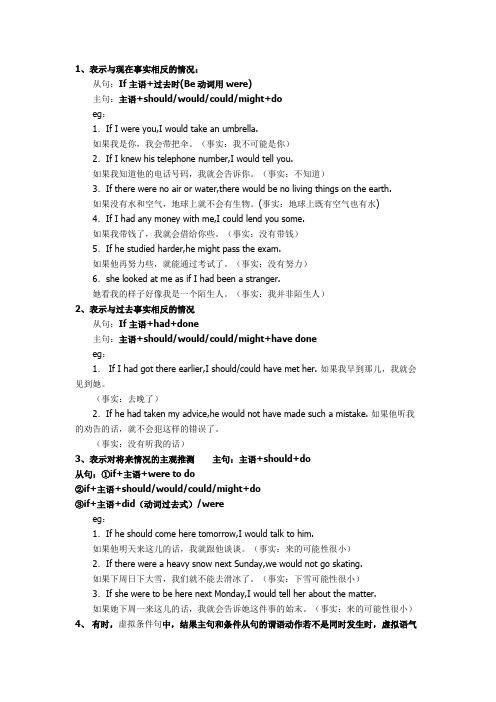
1、表示与现在事实相反的情况:从句:If 主语+过去时(Be动词用were)主句:主语+should/would/could/might+doeg:1.If I were you,I would take an umbrella.如果我是你,我会带把伞。
(事实:我不可能是你)2.If I knew his telephone number,I would tell you.如果我知道他的电话号码,我就会告诉你。
(事实:不知道)3.If there were no air or water,there would be no living things on the earth.如果没有水和空气,地球上就不会有生物。
(事实:地球上既有空气也有水)4.If I had any money with me,I could lend you some.如果我带钱了,我就会借给你些。
(事实:没有带钱)5.If he studied harder,he might pass the exam.如果他再努力些,就能通过考试了。
(事实:没有努力)6.she looked at me as if I had been a stranger.她看我的样子好像我是一个陌生人。
(事实:我并非陌生人)2、表示与过去事实相反的情况从句:If 主语+had+done主句:主语+should/would/could/might+have doneeg:1. If I had got there earlier,I should/could have met her. 如果我早到那儿,我就会见到她。
(事实:去晚了)2.If he had taken my advice,he would not have made such a mistake. 如果他听我的劝告的话,就不会犯这样的错误了。
(事实:没有听我的话)3、表示对将来情况的主观推测主句:主语+should+do从句:①if+主语+were to do②if+主语+should/would/could/might+do③if+主语+did(动词过去式)/wereeg:1.If he should come here tomorrow,I would talk to him.如果他明天来这儿的话,我就跟他谈谈。
if虚拟语气的否定形式
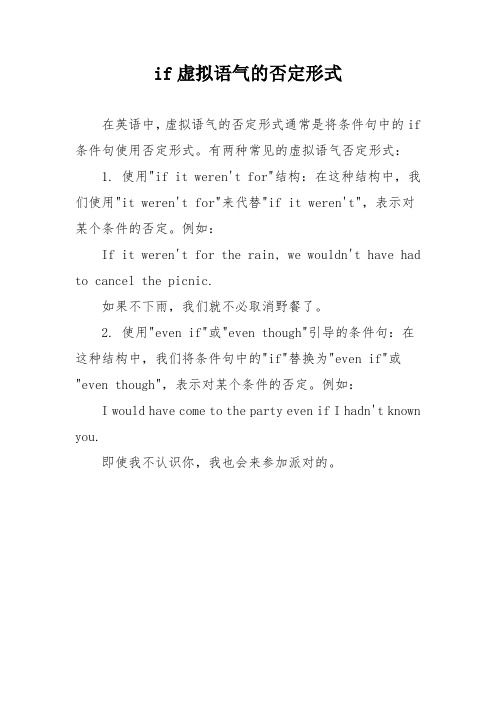
if虚拟语气的否定形式
在英语中,虚拟语气的否定形式通常是将条件句中的if 条件句使用否定形式。
有两种常见的虚拟语气否定形式:
1. 使用"if it weren't for"结构:在这种结构中,我们使用"it weren't for"来代替"if it weren't",表示对某个条件的否定。
例如:
If it weren't for the rain, we wouldn't have had to cancel the picnic.
如果不下雨,我们就不必取消野餐了。
2. 使用"even if"或"even though"引导的条件句:在这种结构中,我们将条件句中的"if"替换为"even if"或"even though",表示对某个条件的否定。
例如:
I would have come to the party even if I hadn't known you.
即使我不认识你,我也会来参加派对的。
if only引导的虚拟语气句子
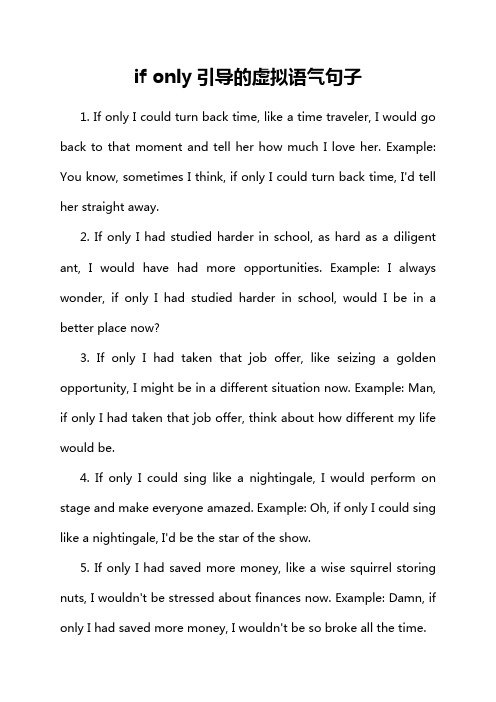
if only引导的虚拟语气句子1. If only I could turn back time, like a time traveler, I would go back to that moment and tell her how much I love her. Example: You know, sometimes I think, if only I could turn back time, I'd tell her straight away.2. If only I had studied harder in school, as hard as a diligent ant, I would have had more opportunities. Example: I always wonder, if only I had studied harder in school, would I be in a better place now?3. If only I had taken that job offer, like seizing a golden opportunity, I might be in a different situation now. Example: Man, if only I had taken that job offer, think about how different my life would be.4. If only I could sing like a nightingale, I would perform on stage and make everyone amazed. Example: Oh, if only I could sing like a nightingale, I'd be the star of the show.5. If only I had saved more money, like a wise squirrel storing nuts, I wouldn't be stressed about finances now. Example: Damn, if only I had saved more money, I wouldn't be so broke all the time.6. If only I could play the piano like a maestro, I would compose beautiful music. Example: I often dream, if only I could play the piano like a maestro, how wonderful that would be.7. If only I had the courage to follow my dreams, as brave as a lion, I would be living the life I truly want. Example: Seriously, if only I had the courage to follow my dreams, I'd be so happy.8. If only I could see the future like a fortune teller, I would make better decisions. Example: Imagine, if only I could see the future like a fortune teller, wouldn't that be insane?9. If only I had said yes to that adventure, like an eager explorer,I would have had more fun memories. Example: Ugh, if only I had said yes to that adventure, I would have had a blast.10. If only I could fly like a bird, I would soar above the clouds and enjoy the view. Example: Wouldn't it be amazing if, if only I could fly like a bird?My view: These if only sentences show our regrets and wishes in life, and they also remind us to cherish every moment and make the right choices.。
if条件状语从句中虚拟语气
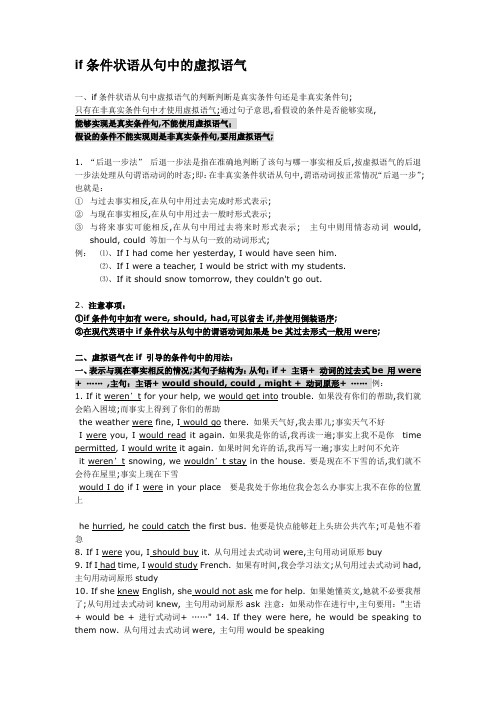
if条件状语从句中的虚拟语气一、if条件状语从句中虚拟语气的判断判断是真实条件句还是非真实条件句;只有在非真实条件句中才使用虚拟语气;通过句子意思,看假设的条件是否能够实现,能够实现是真实条件句,不能使用虚拟语气;假设的条件不能实现则是非真实条件句,要用虚拟语气;1. “后退一步法”后退一步法是指在准确地判断了该句与哪一事实相反后,按虚拟语气的后退一步法处理从句谓语动词的时态;即:在非真实条件状语从句中,谓语动词按正常情况“后退一步”;也就是:①与过去事实相反,在从句中用过去完成时形式表示;②与现在事实相反,在从句中用过去一般时形式表示;③与将来事实可能相反,在从句中用过去将来时形式表示;主句中则用情态动词would,should, could 等加一个与从句一致的动词形式;例:⑴、If I had come her yesterday, I would have seen him.⑵、If I were a teacher, I would be strict with my students.⑶、If it should snow tomorrow, they couldn't go out.2、注意事项:①if条件句中如有were, should, had,可以省去if,并使用倒装语序;②在现代英语中if条件状与从句中的谓语动词如果是be其过去形式一般用were;二、虚拟语气在if 引导的条件句中的用法:1. If it weren’t for your help, we would get into trouble. 如果没有你们的帮助,我们就会陷入困境;而事实上得到了你们的帮助the weather were fine, I would go there. 如果天气好,我去那儿;事实天气不好I were you, I would read it again. 如果我是你的话,我再读一遍;事实上我不是你time permitted, I would write it again. 如果时间允许的话,我再写一遍;事实上时间不允许it weren’t snowing, we wouldn’t stay in the house. 要是现在不下雪的话,我们就不会待在屋里;事实上现在下雪would I do if I were in your place要是我处于你地位我会怎么办事实上我不在你的位置上he hurried, he could catch the first bus. 他要是快点能够赶上头班公共汽车;可是他不着急8. If I were you, I should buy it. 从句用过去式动词were,主句用动词原形buy9. If I had time, I would study French. 如果有时间,我会学习法文;从句用过去式动词had,主句用动词原形study10. If she knew English, she would not ask me for help. 如果她懂英文,她就不必要我帮了;从句用过去式动词knew, 主句用动词原形ask 注意:如果动作在进行中,主句要用:"主语+ would be + 进行式动词+ ……" 14. If they were here, he would be speaking to them now. 从句用过去式动词were, 主句用would be speaking例如:⑴、If you had taken my advice, you would not have made such a mistake.如果你听了我的劝告,就不会犯这样的错误;事实上你没有听我的劝告⑵、I shouldn’t have been able to write such good novels if I hadn’t lived among the peasants for five years.如果我不是和农民生活了五年,就不可能写出这样好的小说;事实上我和农民生活了五年⑶、If you hadn’t invited me, I shouldn’t have come to the party.如果你不邀请我,我就不会来参加你的舞会;事实上你邀请了我⑷、If I hadn’t been ill yesterday, I might have come to school.昨天要是不生病,我是可能来上学的;事实上我生病了⑸、If he hadn’t broken the law, he wouldn’t have been put in prison.如果他不违法的话,就不会被打入监狱;事实上他违法了⑹、If I had been your headmaster, I should have dismissed you from school. 我要是你们校长的话,就把你开除学籍了;事实上我不是注意:如果动作在进行中,主句要用:"主语+ would + have + 完成进行式动词+……⑺、If they had been here, he would have been speaking to them.从句动词用had been, 主句动词用have been speaking⑴、I f I were to work at this problem, I would do it in another way.要是我来解这道难题,我会用另外一种方法的;⑵、I f you were to do such a thing again, you would be punished. 如果你再做这样的事情,就会受到惩罚;⑶、I f I should work harder, I could make much more progress.假如我更努力学习的话,我会取得更大的进步;事实上我不可能努力学习⑷、I f it should rain tomorrow, I would stay at home.如果明天下雨的话,我将待在家里;根据天气情况,明天不可能下雨⑸、I f he should come, I could ask him for some advice.万一他来了,我就能够向他请教;事实上他来的可能性很小⑹、I f he came tomorrow, I would do it with him.如果明天他来的话,我将和他一起做此事;事实上他来的可能性很小⑺、If it should rain, the crops would be saved.从句动词用should rain,主句动词用be 如果天下雨,庄稼可能就收获了;⑻、If he were here, I would give him the books.从句动词用were, 主句动词用give 如果他在这儿,我可能会把书给他;注意:如果动作在进行中,从句不是主句要用:"If + 主语+ 过去进行式动词+……"⑼、If she were staying here now, I would let her ride my horse.从句动词用were staying, 主句动词用let如果她现在留在这儿,我可能会让她骑我的马;。
if引导的虚拟语气的用法归纳
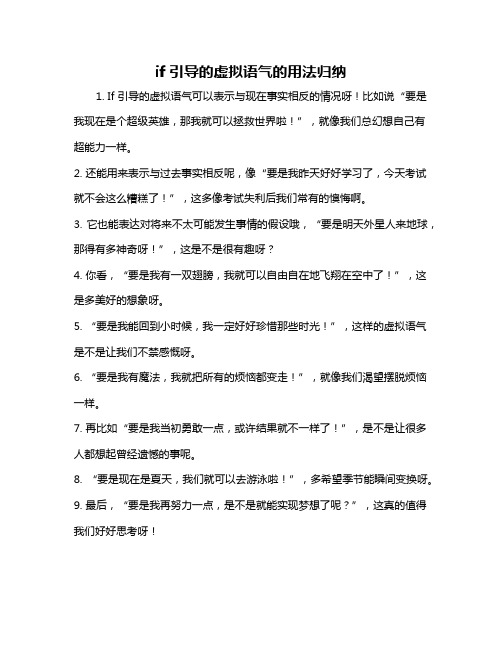
if引导的虚拟语气的用法归纳
1. If 引导的虚拟语气可以表示与现在事实相反的情况呀!比如说“要是我现在是个超级英雄,那我就可以拯救世界啦!”,就像我们总幻想自己有超能力一样。
2. 还能用来表示与过去事实相反呢,像“要是我昨天好好学习了,今天考试就不会这么糟糕了!”,这多像考试失利后我们常有的懊悔啊。
3. 它也能表达对将来不太可能发生事情的假设哦,“要是明天外星人来地球,那得有多神奇呀!”,这是不是很有趣呀?
4. 你看,“要是我有一双翅膀,我就可以自由自在地飞翔在空中了!”,这是多美好的想象呀。
5. “要是我能回到小时候,我一定好好珍惜那些时光!”,这样的虚拟语气是不是让我们不禁感慨呀。
6. “要是我有魔法,我就把所有的烦恼都变走!”,就像我们渴望摆脱烦恼一样。
7. 再比如“要是我当初勇敢一点,或许结果就不一样了!”,是不是让很多人都想起曾经遗憾的事呢。
8. “要是现在是夏天,我们就可以去游泳啦!”,多希望季节能瞬间变换呀。
9. 最后,“要是我再努力一点,是不是就能实现梦想了呢?”,这真的值得我们好好思考呀!
总之,if 引导的虚拟语气真的很神奇,能让我们想象各种不可能的事情,让我们的思维更加开阔呢!。
if引导的虚拟语气条件句
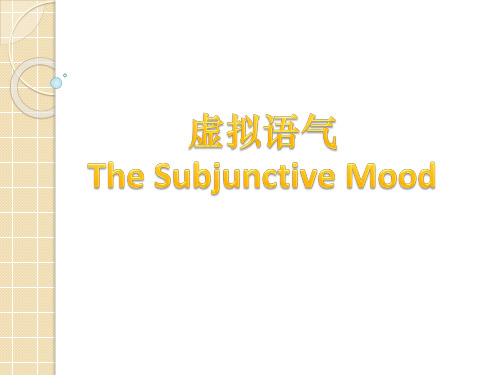
与目前事实相反,目前没有迅速
完毕
2)If I were you, I would have gone to her birthday party
yesterday.假如我是你,我就去参加她昨天旳生日聚会了
(从句阐明目前,主句阐明过去)。
♦ 要根据动作发生旳时间选择恰当旳动词形式。
特例
2.省略If旳条件从句
6.If I __ in the 22nd century, I __ my vocation in a very different way. A. should live; would spend B. will live; should spend C. are living; should have spent D. will be living; would have spent 7. __ it rain tomorrow, we would have to put off the visit to Mountain Tai. A. Were B. Should C. Would D. Will
假如条件句中有were/had(助动词)/should时,可使用 倒装句构造——省略If,把were/had(助动词)/should放 句首。假如条件句是否定句时,not应置于主语后,不能 与were/had(助动词)/should等缩略成 weren’t/hadn’t/shouldn’t.
例:Had I seen him then, I would have been very happy. =If I had seen him then, I would have been very happy.
If + 主语 + had + 动词旳过去分词 主语+would(should
if条件状语从句中虚拟语气
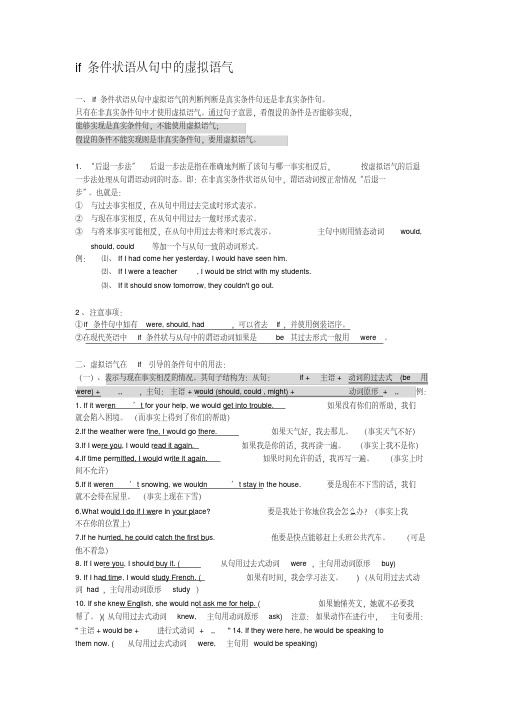
if条件状语从句中的虚拟语气一、if条件状语从句中虚拟语气的判断判断是真实条件句还是非真实条件句。
只有在非真实条件句中才使用虚拟语气。
通过句子意思,看假设的条件是否能够实现,能够实现是真实条件句,不能使用虚拟语气;假设的条件不能实现则是非真实条件句,要用虚拟语气。
1. “后退一步法”后退一步法是指在准确地判断了该句与哪一事实相反后,按虚拟语气的后退一步法处理从句谓语动词的时态。
即:在非真实条件状语从句中,谓语动词按正常情况“后退一步”。
也就是:①与过去事实相反,在从句中用过去完成时形式表示。
②与现在事实相反,在从句中用过去一般时形式表示。
③与将来事实可能相反,在从句中用过去将来时形式表示。
主句中则用情态动词would,should, could 等加一个与从句一致的动词形式。
例:⑴、If I had come her yesterday, I would have seen him.⑵、If I were a teacher, I would be strict with my students.⑶、If it should snow tomorrow, they couldn't go out.2、注意事项:①if条件句中如有were, should, had,可以省去if,并使用倒装语序。
②在现代英语中if条件状与从句中的谓语动词如果是be其过去形式一般用were。
二、虚拟语气在if 引导的条件句中的用法:(一)、表示与现在事实相反的情况。
其句子结构为:从句:if + 主语+ 动词的过去式(be 用were) + ,,,主句:主语+ would (should, could , might) + 动词原形+ ,,例:1. If it weren’t for your help, we would get into trouble. 如果没有你们的帮助,我们就会陷入困境。
(而事实上得到了你们的帮助)2.If the weather were fine, I would go there. 如果天气好,我去那儿。
if引导的虚拟语气用法
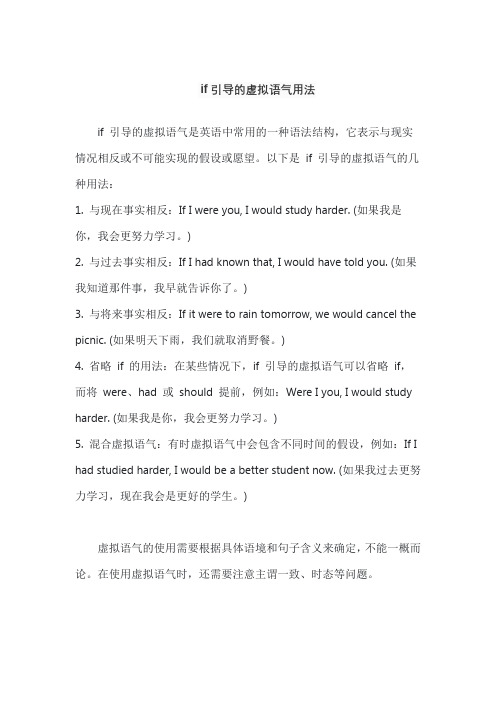
if引导的虚拟语气用法
if 引导的虚拟语气是英语中常用的一种语法结构,它表示与现实情况相反或不可能实现的假设或愿望。
以下是if 引导的虚拟语气的几种用法:
1. 与现在事实相反:If I were you, I would study harder. (如果我是你,我会更努力学习。
)
2. 与过去事实相反:If I had known that, I would have told you. (如果我知道那件事,我早就告诉你了。
)
3. 与将来事实相反:If it were to rain tomorrow, we would cancel the picnic. (如果明天下雨,我们就取消野餐。
)
4. 省略if 的用法:在某些情况下,if 引导的虚拟语气可以省略if,而将were、had 或should 提前,例如:Were I you, I would study harder. (如果我是你,我会更努力学习。
)
5. 混合虚拟语气:有时虚拟语气中会包含不同时间的假设,例如:If I had studied harder, I would be a better student now. (如果我过去更努力学习,现在我会是更好的学生。
)
虚拟语气的使用需要根据具体语境和句子含义来确定,不能一概而论。
在使用虚拟语气时,还需要注意主谓一致、时态等问题。
- 1、下载文档前请自行甄别文档内容的完整性,平台不提供额外的编辑、内容补充、找答案等附加服务。
- 2、"仅部分预览"的文档,不可在线预览部分如存在完整性等问题,可反馈申请退款(可完整预览的文档不适用该条件!)。
- 3、如文档侵犯您的权益,请联系客服反馈,我们会尽快为您处理(人工客服工作时间:9:00-18:30)。
2._____,the forest fire would have been discovered much earlier.
A. But for their care B. If they were careful C. Without their care D. If they had been more careful
2. If I were you ,I wouldn't be so proud.
二、与过去事实相反
1.If he had taken my advice, he would not have made such a mistake.
2.If I had got there earlier, I would have met her.
instructions.
从句
主句
if+一般现在时,祈使句
虚拟条件句
If引导的虚拟条件句,即非真实条件 句,表示条件句所表示的条件根本 不可能实现或实现的可能性很小。 根据动作发生时间的不同,含有非 真实条件句的复合句的主从句的谓
时间
从句
主句
与现在事实相反
过去式 (be 通常用were)
should would could might
6.If we ____ the other road, we might have arrived here in time for the meeting.
A. take B. had taken C. took D. have taken
(2)单句改错
①He wouldn’t feel so cold if he was indoors. was→were
5.Had I known about the computer program, a huge amount of time and energy_____.
A. would have been saved B. had been saved C. will be saved D. was saved
三、与将来的事实相反
1.If there were a heavy snow next Sunday, we would not go skating.
2.If she should come, I would tell her about the matter.
1. The printer is of good quality. If it _____break down within the first year , we would repair it at our expense. A. would B. should C. could D. might
真实条件句和 虚拟条件句
真实条件句
1.表示客观事实或真理
If you freeze water, it turns to ice. If you eat a lot of chocolate, you put on weight.
从句
主句
if+一般现在时,一般现在时
2.表示将来可能发生的事
If he fails in the exam, he will let his
4.—The weather has been very hot and dry. —Yes. If it had rained even a drop, things would be much better now! And my vegetables____.
A. wouldn’t die B. didn’t die C. hadn’t died D. wouldn’t have died
+动词原形
与过should would could +have+过去分词 might
与将来事实相反
① 过去式(be 通常 用were)
② should+动词原形 ③ were to+动词原形
should would could might
+动词原形
一、与现在事实相 反
1. If I knew his telephone number, I would tell you .
②If we had started earlier, we couldn’t had missed the
first bus. ③If he had time, he will come.
第二个had→have had→has
Thank you !
parents down.
从句
主句(陈述句)
You will certainly succeed if you keep on
tryifi+n一g.般现在时,一般将来时(will+动词原形)
3.给某人提建议或命令某人做某事 If you feel sleepy, go to bed. If you want to know how it works, read the
